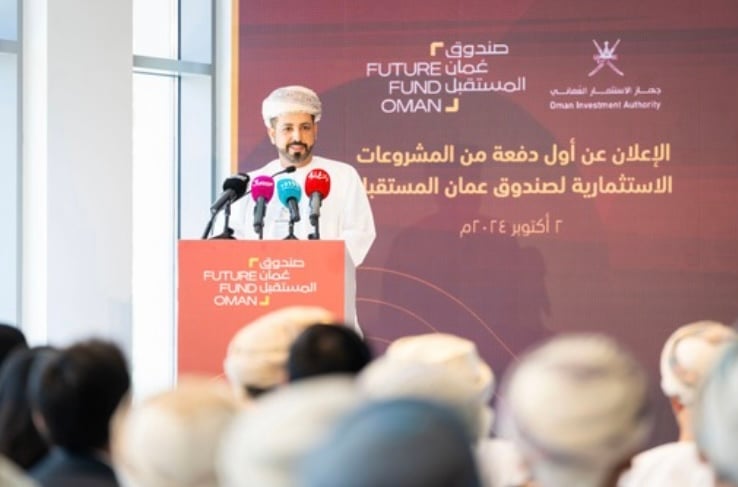Al Jarf: OIA has implemented a meticulous process to ensure sound investment decisions
Future Fund Oman (FFO), Oman Investment Authority’s latest investment fund, has unveiled its inaugural batch of approved investment projects in collaboration with local entities and international investors. With a total value exceeding OMR 832mn, split between OMR 609mn committed by foreign investors and OMR 220mn committed by FFO, these projects are expected to generate over 1,600 direct employment opportunities.
The first batch of approved investment projects covered ten key sectors within Oman. Major projects operate in technology, industry and manufacturing, tourism, green energy, and electric vehicles, while SME and startup projects focus on food, health, technology, financial technology, and e-commerce.
Mulham Al Jarf, Deputy President for Investments at Oman Investment Authority, emphasized that these projects mirror OIA’s commitment to fulfilling the strategic objectives of Future Fund Oman. These objectives revolve around stimulating growth in the local economy, boosting targeted economic sectors, fostering collaboration with the private sector, attracting foreign investments, and creating opportunities for local employment and business growth for SMEs and startups. He further noted that these are only the first group of projects approved since FFO’s establishment on January 17, 2024. The Fund has received substantial interest from local and foreign investors, with over 212 applications submitted. Al Jarf added that OIA has implemented a meticulous process to ensure sound investment decisions.
Under the direct local projects mandate, FFO has approved three key projects including United Solar’s manufacturing facility in Sohar Freezone. This will be one of the world’s largest facilities and a first in the Middle East’s polysilicon industry. Its annual capacity reaches 100,000 tonnes of polysilicon, a key component in downstream renewable energy sectors such as the solar panels industry. The IDG Oman Investment Fund, in partnership with the Chinese IDG Capital Fund, leverages its diversified investment expertise to drive progress in ICT, renewable energy, and electric vehicles in Oman. Additionally, the eWTP Oman Fund, in collaboration with the Chinese eWTP Capital Fund, strategically invests in sectors such as ICT, energy, tourism, and agriculture, aiming to foster investment in the Omani market through partnerships with promising Chinese enterprises.
FFO has also approved a number of SMEs and startup projects, which will be managed in partnerships with fund managers such as Tanmia, ITHCA, Omantel, and Cyfr Capital. The IO Kitchen project, a cutting-edge cloud kitchen featuring over 30 virtual brands, redefines the food experience and delivery scene by integrating state-of-the-art technologies. Similarly, the Bima project has pioneered online insurance brokerage services in Oman, while the Qpay project stands as the first licensed Omani entity to offer the ‘buy now, pay later’ service within the local market. Leveraging artificial intelligence, the BcLear Aligner project is reshaping traditional dental braces, while the Nashid project introduces secure and accessible digital identity solutions for all, integrating blockchain and AI verification processes. The Antom digital financial platform employs API management technologies to empower Oman’s financial institutions and fintech companies.
Further fortifying Oman’s financial and tech sectors are projects such as Al-Modawi, a specialized medical tourism platform enabling users to locate credible healthcare providers and arrange comprehensive medical tourism experiences. The Fascano project provides intelligent sourcing solutions for the food, hospitality, and event industries, bridging the gap between MENA regional merchants and their customers. Edfa Pay transforms mobile phones into secure payment devices for commercial transactions, while Zumr utilizes algorithms to modernize traditional saving associations, ensuring a secure and easily accessible financial solution. The Monak electronic portal caters to foreign workers by offering financial services and simplifying registration processes for employers and recruitment agencies. Additionally, the Sampo AI platform focuses on pricing strategies for e-commerce enterprises, and the Bon+ project streamlines hotel, restaurant, and catering services by connecting users with reliable suppliers and facilitating wholesale transactions in a single platform.
Adding to these projects are platforms like BidBid, an e-procurement solution incorporating live auctions and data analysis to streamline negotiations, communications, and evaluations. The Serb project introduces innovative drone management solutions utilizing the UTM platform, ensuring safe and efficient flight operations in various industries.
The Fund’s strategy for investing in direct local projects involves either entering the project as a shareholder or providing investment loans. This is based on specified pre-defined criteria, ensuring that the Fund’s ownership does not exceed 40% while focusing on growth-oriented projects with investments ranging from OMR5 to 100mn. On the other hand, the investment nature in SME and startup projects consists of partnerships or venture capital investments. It has an investment cap of OMR5 mn and emphasizes supporting growth and expansion without acquiring majority shares in these projects.
Future Fund, established by the Oman Investment Authority in collaboration with the Ministry of Finance, boasts a capital of OMR2 bn allocated over a five-year period spanning from 2024 to 2028. This fund strategically invests across all national sectors except oil and gas and real estate. Interested investors are encouraged to submit their applications via the dedicated online platform www.futurefund.om. Each project undergoes thorough evaluation based on predefined criteria to ensure its economic viability and alignment with the Fund’s national objectives
